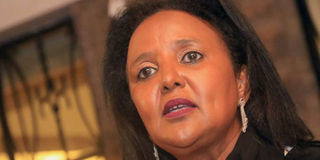CS Mohamed must rein in errant university councils

Foreign Affairs Cabinet Secretary Amina Mohamed speaks during the celebration of the 84th birthday Akihito, Emperor of Japan, on December 7, 2017 at the embassy of Japan in Nairobi. She has been nominated as Education Cabinet secretary. PHOTO | JEFF ANGOTE | NATION MEDIA GROUP
What you need to know:
- The roles of the various organs are distinct; so, when councils usurp the powers of senates and management, chaos ensues.
- Dr Mohamed ought to rein in errant councils and, if possible, reconstitute all of them.
As Foreign Affairs Cabinet Secretary Amina Mohamed takes over at the helm of the Ministry of Education, she has to rethink one well-intended policy that seems to have created a chaotic situation in the sector.
Former CS Fred Matiang’i demonstrated extraordinary zeal and commitment to streamline management of the institutions in his docket.
Having dealt with the primary and secondary school leaving examinations, he turned his guns on university management, issuing a raft of directives and making major changes in appointment of university councils, many of which seem to have misunderstood the minister.
The policy shift to appoint council members from the private sector and non-governmental organisations was meant to inject fresh blood into the university system and cure perceived lethargy bedevilling administration of the institutions of higher learning.
This was seen as a panacea to the inbreeding of ideas in the intellectual world.
VICE-CHANCELLORS
But it appears that Dr Matiang’i created a Pandora’s box that is now opening.
To be appointed chairman of the council, one simply needs to possess a PhD degree and, for a member, a master’s.
There is no scientific proof that a doctorate can make one with little understanding of the workings of a university a good council chair.
It has emerged that many of those appointed have no idea about how universities are run but do not want to be advised.
It is this realisation that necessitated vice-chancellors to suggest to the ministry that councils should have in their membership at least one respectable scholar and seasoned university administrator who has been in academia for a considerable period of time.
DISHARMONY
Questions have emerged on the competence of these councils to hire professors whose credentials they don’t have.
Most councils hardly appreciate the boundary between their role and management’s.
The chairs behave like chief executives, meddling in administration.
Some are known to undermine the VCs by giving power to junior officers whom the latter should otherwise supervise.
The roles of the various organs are distinct; so, when councils usurp the powers of senates and management, chaos ensues.
It goes against the letter and spirit of the Universities Act, universities’ statutes and State Corporations Advisory Committee (SCAC) regulations.
COUNCIL MEMBERS
Ideally, councils should only deal with staff through the VCs and principals and their role is limited to approving policies. Period.
Few public universities have cordial working relations between management and the council.
Conflicts even arise out of the number of council meetings.
But since VCs play safe to protect their jobs, they hardly express their frustration.
They, then, become accomplices in theft of public resources.
But even more troubling is that the council members being ever present on campuses makes it difficult for the CEOs to manage universities.
ALLOWANCES
They intimidate VCs into holding as many meetings as possible — not one per quarter — to earn allowances.
One major role of university councils is fundraising. Interestingly, hardly any of them has.
Instead, members take every opportunity to lecture VCs and condemn them for not having raised funds.
The question of integrity of some council members has come to the fore: From displaying open subjectivity in hiring a CEO to turn themselves into lynch dogs and acting injudiciously without competent investigations.
Dr Mohamed ought to rein in errant councils and, if possible, reconstitute all of them.
Mr Ominde is an economist based in Nairobi. [email protected].




